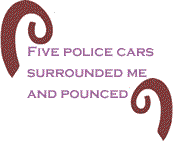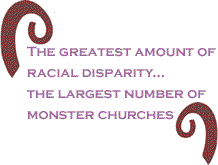
|
||||||||||||||||||||||
|
||||
 |
||||
As
I rode into I was talking to a man. He said, �There used to be a lot of black families right over here, this section of town, all along here. But they are all gone now. But maybe they didn�t leave.� �What do you mean?� I asked. �Well maybe one night their husband never came home, so the woman just left with the kids,� he replied.
�Now the black people are just over there, the other part of town.� �Someone said we should get rid of them all, but hey, everything that is illegal, you got to go to the black people to get it.� It was a bit of a chilling conversation but straight forward enough. I wondered if he was talking or confessing. Confessing for himself or for the town? The
further I traveled into The further east I got the more segregation I saw, the blacks in small poor communities with next to no jobs, �That is where all the crime is� the Sheriff said. �Shootings, stabbings, drugs. Someone can�t pay their drug bill, they just shoot them.� The blacks talked like Akha discussing something they couldn�t change, like the number of years they�d be in prison, the problems at checkpoints with the cops. The stories weren�t so different. A people outgunned in one fashion or another. The blacks never complained to me. The whites were often ready to admit as the conversation rolled around, that �you know, I don�t mean to sound racist, but we got problems with a certain group of people.� I got stopped by police a few times. But as I went east and south, the conversations changed a bit, the way the cars stopped changed a bit. �Where you hitch hiking?� �Hey, there.� A bit like �hey boy� was what they wanted to add to the end of the sentence, like they were used to talking to a certain group of people who immediately responded with a cowed look. In one town, five police cars surrounded me and pounced. �Someone called in and said they saw you walking out from behind the pawn shop with a saddle. We had to respond.� �Oh,
I thought maybe I forgot to get a permit for the saddle,� I commented,
knowing we�d all be having a different conversation had I been black,
here or in
�Someone ought to AK-KKKKK that n-----.� a man said the moment he met me And so the conversations went. In
one town I got stopped three times in the space of an hour. Cops followed this guy on a horse to a crack house. He was a really good horse trainer. They stopped him on his way home. �All right, I confess I bought four rocks, one for me and three to sell.� So he went up the river for �trafficking�. A black man. Course the crack house didn�t get shut down, it was there to see how many black guys it could expel to the greybar hotel. It was like a game, sifting and sorting, extracting a generation of black men to prison, the industry run more often than not by white private prison companies.
Whites told me how blacks always complained to them how unfair everything was. Whites were quick to tell me that. Course I didn�t here any blacks say that to me. A few blacks apologized, said things were �ok� like maybe I was guessing they weren�t at all. Stay close to home, don�t go out late at night. Know your �place� and stay safe. � Drugs
were an excuse to jack up everyone in the country. It was worse
than McCarthy. The biggest thing to fear in People were good, we didn�t have any problems on the trip. Mostly the cops were good, friendly, open, honest.
I saw a few baggy low slung trousers and wondered about the insurgency. The young blacks who became agents of drugs or what ever they could, fighting a system that had never really wanted to give up hand picked cotton. I remember the black woman who said at the end of slavery, �they�ll just have to find someone else to nurse their babies.� However it was, the blacks were a lower tier in a society that wouldn�t admit they were still the defacto slaves, kept in the back yard till needed, otherwise a big bother that �doubled the police budget.� I traveled through small communities, a few small houses or trailers, no visible social services, and obviously no jobs. I had not lived much in the south, but it didn�t appear to me much had changed at all from what I had heard it was like.
I remembered that the first thing I did when I went in an Akha village I hadn�t been in before was shut off the engine and listen to the dogs. Barking dogs told me about police, army and anything that had gone wrong. In the south, nothing was different, the dogs told the same story, three and four per yard. �Yeah, it�s odd. Down there you�ll see 80% blacks pushed around by 20% whites. Seems to be the way they like it.� The black horse shoer had a scar on his face. I asked him how it was? �Ah, people don�t treat you too bad. I mean�� he got a far away look in his eyes, looked the other way across the back of his pick up truck. �Yeah, he went to prison.� The man looked like there wasn�t anything else he could say. One
lady in Some black towns I passed through, it was clear there was no work, no industry. If they wanted to work, they�d have to commute to some other town. In
bigger cities when I got to a crowded commercial area where fast
food restaurants were more abundant than anything else, I could
tell I was in the �black neighborhood�. There is something about
limiting food choices to less healthy fast food that I saw more
common in black neighborhoods, something similar I had seen on The US Army has looked at the gang situation in the black community as an insurgency. And well it may be, young people unwilling to roll their eyes and accept the inevitable, pretend things were not as they really are, pretend that based on some promises of all the white people they could have a better life. Gangs are about economics, like the mafia, people wanting a better life for themselves based on organizing, maybe in places where they don�t let the union organize parts of life anyway. What
ever I did and didn�t understand about the black community, there
were all the things I read in eyes, in the tones of voices, all
the things unsaid by the Tier 2 folks that left me all that much
more convinced I wouldn�t want to be in their shoes. Black in In order to do away with the two tier system the first tier is going to have to be retired. The churches and political system that enable it all, are going to have to be completely changed. The whites would have me believe that there wasn�t a relationship between the richer white communities and the poorer black communities. I
got the same feeling I had gotten years ago in the north of
In
The blacks rattled by in old cars, in bad repair, just getting buy if at all. I stuck my thumb out for a ride. As the car passed I saw it was the sheriff. It whipped quick into a lot and prepared to turn around. An old cadilac slowed and did a u-turn. The lights flashed at me, I grabbed my saddle and horse blankets and jumped in, it was an old black man headed home two towns over. I just barely missed my appointment with the sheriff. Blackcommentator.com
Guest Commentator, Matthew McDaniel, was born in Back in the |
||||
 |
||||
If you would like to comment on this article, please do so below. There is a 400 character limit. You do not need a FaceBook account. Your comment will be posted here on BC instantly. Thanks. Entering your email address is not mandatory. You may also choose to enter only your first name and your location.
|
||||
Thank you very much for your readership. |
||||
| Any BlackCommentator.com article may be re-printed so long as it is re-printed in its entirety and full credit given to the author and www.BlackCommentator.com. If the re-print is on the Internet we additionally request a link back to the original piece on our Website. | ||||
| |
||||
| November
19 , 2009 Issue 351 |
| Executive Editor: Bill Fletcher, Jr. |
| Managing Editor: Nancy Littlefield |
| Publisher: Peter Gamble |
| Est. April 5, 2002 |
| Printer Friendly Version in resizeable plain text format |
 |

|
 |
| |
| |
































 �Or
maybe nobody went away. There used to be a lot of Klan who came
down here from Lubboc. Maybe the whole family disappeared one night.
Would be easy enough to do. You just knock a hole in the top of
the septic, you put everyone through it and you pour a fresh cement
patch and cover it up with dirt and grass, no one saw nothing and
the whole family is there to this day. Maybe more than one family
disappeared that way.�
�Or
maybe nobody went away. There used to be a lot of Klan who came
down here from Lubboc. Maybe the whole family disappeared one night.
Would be easy enough to do. You just knock a hole in the top of
the septic, you put everyone through it and you pour a fresh cement
patch and cover it up with dirt and grass, no one saw nothing and
the whole family is there to this day. Maybe more than one family
disappeared that way.� When
people get used to treating one class of people a certain way, they
have a hard time turning it off for a wayfarer. You know what they
are up to when you aren�t around.
When
people get used to treating one class of people a certain way, they
have a hard time turning it off for a wayfarer. You know what they
are up to when you aren�t around.

 Churches
on every corner tried to reassure me that �everything was just fine,�
but I knew it wasn�t. The only part about it that was fine was that
it was just the way the Tier 1 people wanted it. �Its just the way
it should be�. The greatest amount of racial disparity was accompanied
by the largest number of monster churches. As if saying, �Look how
white the plantation is.�
Churches
on every corner tried to reassure me that �everything was just fine,�
but I knew it wasn�t. The only part about it that was fine was that
it was just the way the Tier 1 people wanted it. �Its just the way
it should be�. The greatest amount of racial disparity was accompanied
by the largest number of monster churches. As if saying, �Look how
white the plantation is.�












